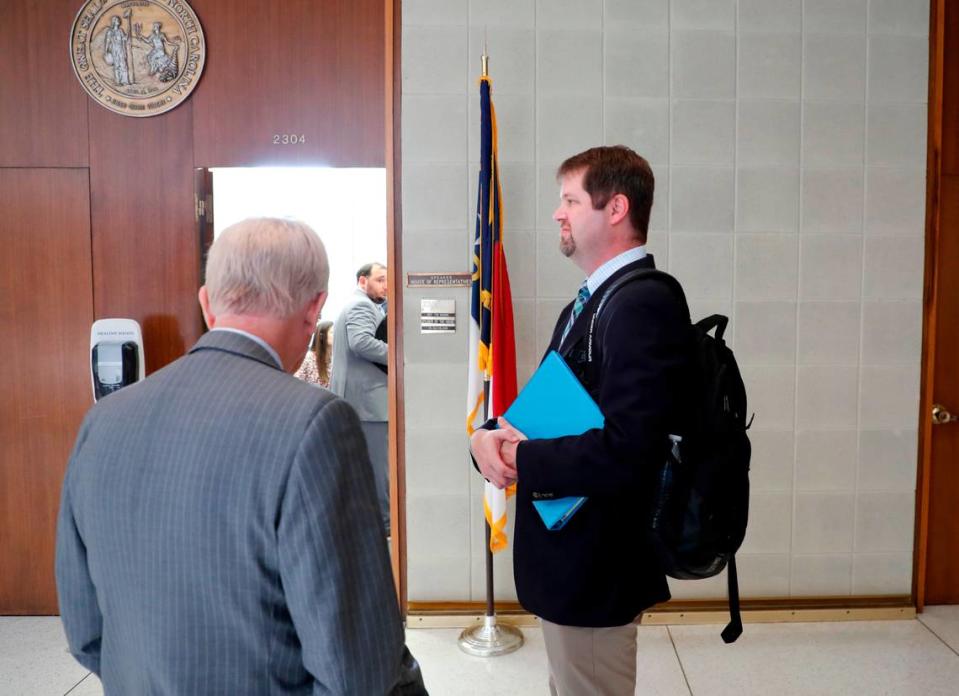Senate Republicans push bill to eliminate NCHSAA, but what’s the end game?
Did someone forward this to you? Click here to subscribe to this weekly newsletter.
Hello. It’s Friday.
For months, tensions between Republicans on Jones Street and the North Carolina High School Athletics Association have been escalating.
The private nonprofit, which has overseen high school sports in North Carolina since 1913, first drew the attention of lawmakers almost two years ago. In the time since then, Republican legislators have pressed the NCHSAA and its commissioner, Que Tucker, on its governance of high school athletics, and its finances — in particular, the roughly $41 million in assets it held as of 2020.
Last December, a trio of Senate Republicans — Todd Johnson of Union County, Tom McInnis of Anson County, and Vickie Sawyer of Iredell County — stepped up their inquiry and requested the NCHSAA for its last 10 years of 990 filings and financial audits. And in April, the legislature’s joint oversight committee, headed by Senate leader Phil Berger and House Speaker Tim Moore, launched a formal investigation into the NCHSAA, with a panel of House and Senate lawmakers grilling Tucker for more than two hours.
After months of back-and-forth, lawmakers decided this week talks were going nowhere.
On Tuesday, Senate Republicans unexpectedly introduced a new version of existing legislation, House Bill 91, to remove the NCHSAA’s authority to administer high school athletics and split its responsibilities between the State Board of Education and a new athletics commission whose members would be appointed by the governor and legislative leaders. During a virtual press conference that night, Tucker called the proposal “a full-scale attack” on the NCHSAA and accused lawmakers of injecting politics into high school sports.
Republican lawmakers were undeterred, passing the bill out of the Senate Education Committee on Wednesday and the Senate Finance Committee on Thursday. And while Democratic members objected to the bill’s rapid advancement, it passed both committees without any audible “no” votes.
So, what happens next? House Bill 91 is due next in the Senate Rules Committee, from where it could reach the Senate floor. The earliest that could happen is the week of August 2, since Berger announced on Thursday the Senate won’t be voting on any bills next week. But even if HB 91 passes both the Senate and the House, it’s unclear how it’ll be received by Gov. Roy Cooper, or if it will garner enough Democratic support to override a potential veto.
Plus, is it possible lawmakers don’t actually intend to see this bill through to becoming law?
Here’s what Johnson told us on Wednesday after the education committee meeting: “If this legislation is what it takes to get the (NC) High School Athletics Association to work with us and make desperately needed changes, then great, then this has been a great success.”
The NCHSAA appeared to receive that signal, dispatching Assistant Commissioner James Alverson to speak to the committee on Wednesday and meet with lawmakers. Alverson told us the organization is aware there are areas where it can make improvements and wants to “work with individuals who want to work with us,” before he and Randolph Cloud, a prominent Raleigh lobbyist, met with Moore on Wednesday.

Wrongfully convicted and seeking a pardon
What happens in North Carolina if you’re convicted of a crime, spend several years in prison, and are eventually exonerated and let go?
On this week’s Closer Look podcast, Will Doran talks with Nina Pasquini about Dontae Sharpe, who was released from prison in 2019 after spending 26 years locked up for a murder he didn’t commit. Two years later, Sharpe is still fighting for up to $750,000 in restitution he qualifies for but can’t access until Gov. Roy Cooper grants him a full pardon.
What we’re reading
In Trump’s Jan. 6 recast, attackers become martyrs, heroes, from the Associated Press.
‘I’ll Never Forget You’: Veterans Work to Get Afghan Partners in War to the U.S., from The New York Times.
Karl Rove talks Trump, Cawthorn, NC11, from the Smoky Mountain News.
More big stories from the team
The temporary fencing, installed around Gov. Roy Cooper’s mansion in downtown Raleigh amid Black Lives Matter and ReopenNC protests, was removed after a year this week, Dawn Baumgartner Vaughan reported.
A year after five sheriff’s deputies and a nurse were charged in the death of John Elliott Neville at Forsyth County jail, the case has stalled, public records have been withheld, and Neville’s family hasn’t received any compensation, Danielle Battaglia reports.
Democratic and Republican candidates for next year’s U.S. Senate race in North Carolina weigh in on whether the expanded child tax credit passed in the Biden administration’s American Rescue Plan should be made permanent. Brian Murphy gives us a rundown.
After Gov. Roy Cooper said this week he’ll allow the statewide mask mandate on schools to expire at the end of this month, attention is turning to vaccinations, but Senate leader Phil Berger says mandating vaccines only authorized for emergency use in schools is “problematic,” Dawn Baumgartner Vaughan reported.
A bill legalizing medical marijuana in North Carolina has now passed two of the four committees it needs to clear before it can receive a full vote on the Senate floor, Will Doran reports.
Don’t forget: Listen and subscribe to our podcast wherever you usually like to listen. (Pandora, Spotify, Apple Podcasts, Stitcher, iHeartRadio, Amazon Music, Megaphone.)
Thanks for reading. See you next week.
— Avi Bajpai, political reporting intern for The News & Observer. Email me at abajpai@newsobserver.com.

